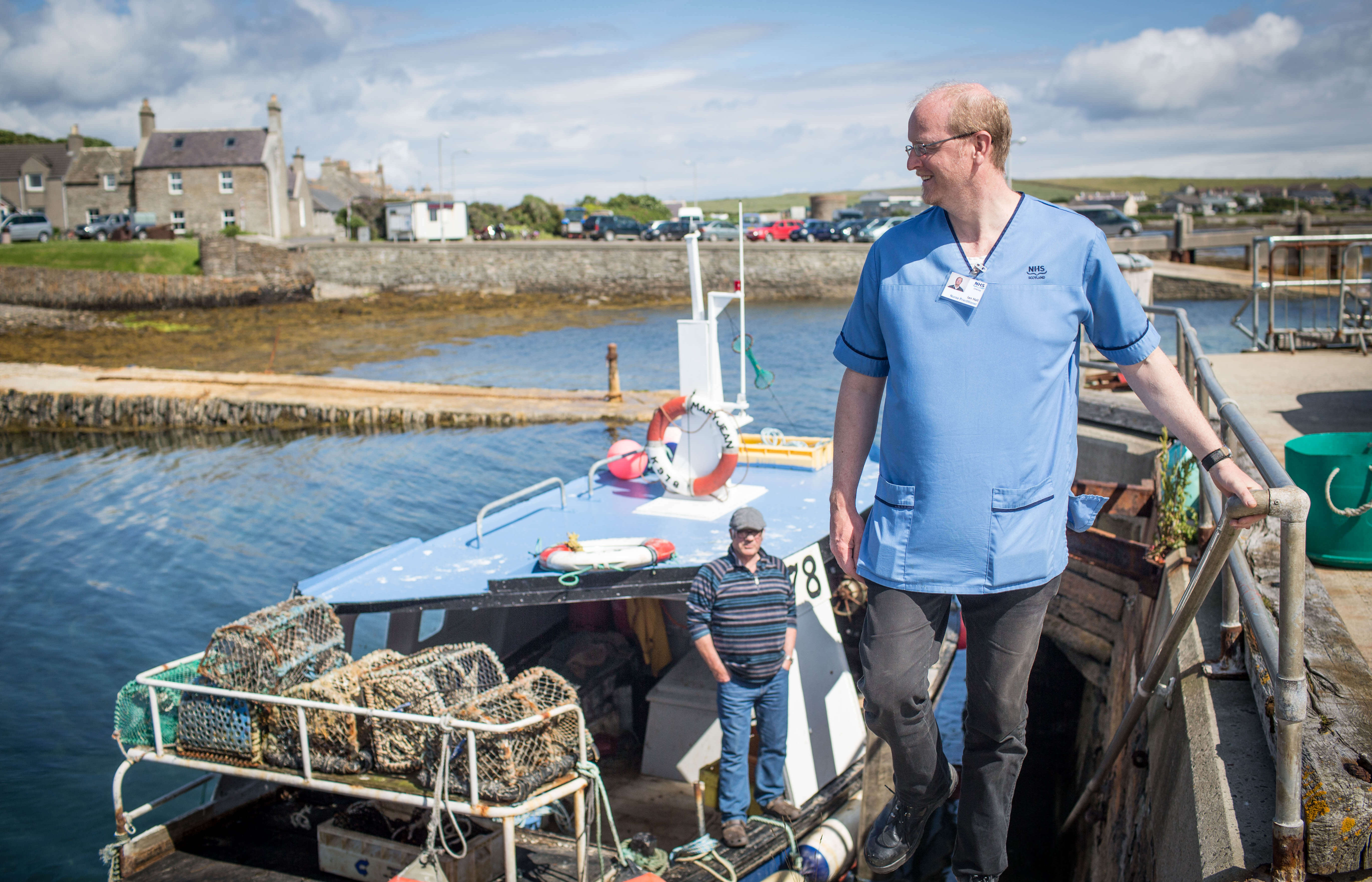
Community mental health nurse
Community mental health nurses support people who are struggling with mental health difficulties such as depression, anxiety, psychosis, suicidality, substance misuse, and the effects of trauma. They offer therapeutic interventions to alleviate mental distress, as well as early intervention and intensive care that can prevent admission to hospital. Community mental health nurses prioritise human rights-based approaches, promoting choice and control for people receiving mental health care and treatment.
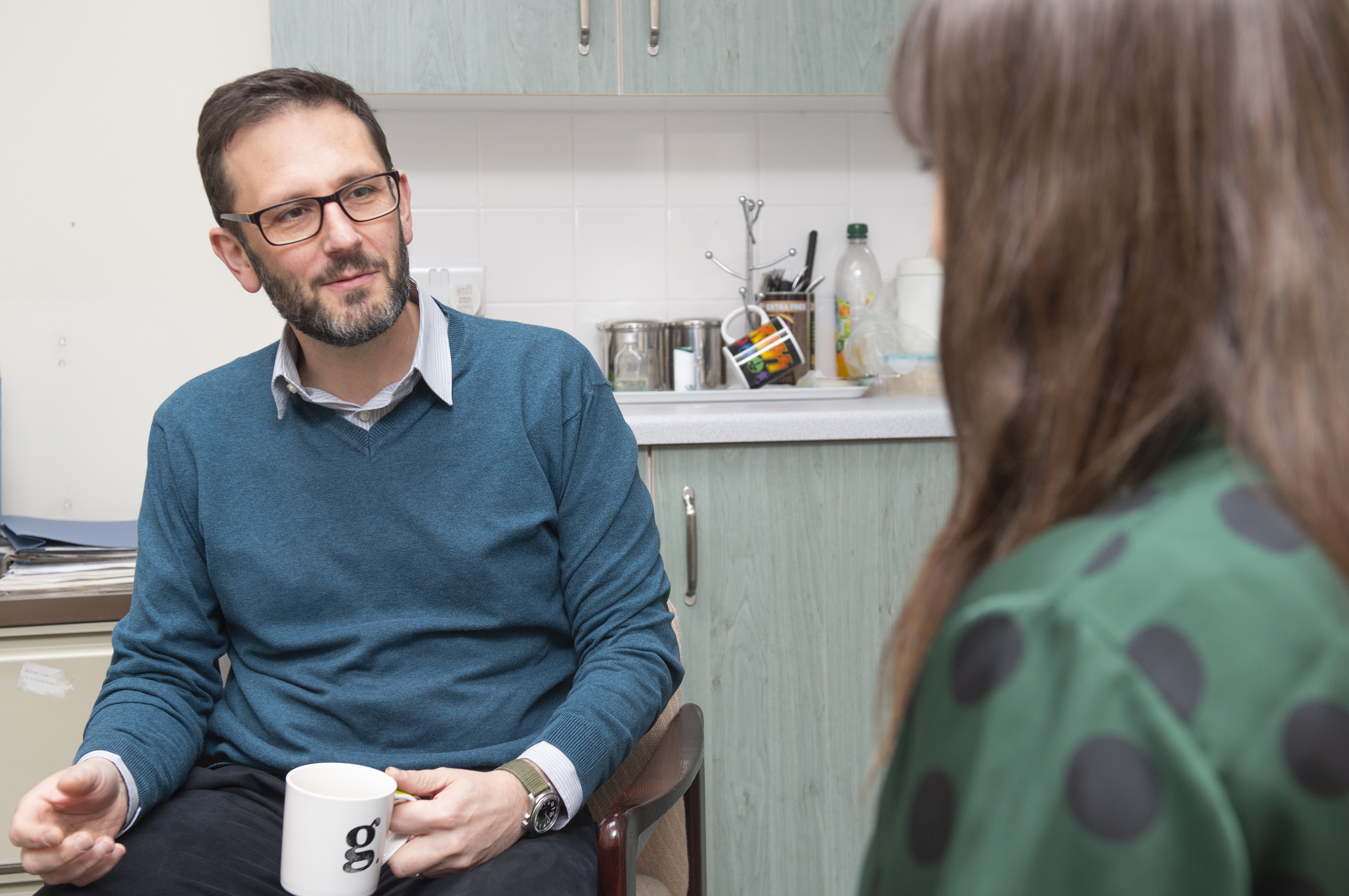
Gerry Hastie
A passionate advocate for community mental health nursing, Gerry is proud to be a nurse that colleagues seek out for advice and support given his broad knowledge and clinical expertise.
Leaving school, I thought I had wanted to do something in the arts and entertainment industry, but I realised that wasn’t for me. I was looking for something else, and it was witnessing the care my dad received when he was ill and participating in his care that made me start to think about becoming a nurse. I had a chance encounter around that time when I bumped into an old school friend on a bus. As we were catching up, she was describing how she was a student mental health nurse, and I quite liked the sound of it.
Within a couple of months of thinking about it, I was off to college in Fife where I did my initial mental health nurse training before completing a Bachelor of Nursing at the University of Dundee. I worked for a while in acute mental health admission, before moving into the addiction service at NHS Fife. I became a Community Mental Health Nurse 14 years ago and really believe that it’s only in the community that one can truly understand the context in which a person lives and how any health problem impacts upon them.
Based in the Levenmouth area, the job is a mixture of home visits and clinic-based appointments where I carry out a holistic assessment of adults with a wide range of mental health problems.
My job is talking to people, having important conversations, and it’s about having the ability to build good relationships to decide with them what is the best way to help them. As an experienced mental health nurse, I bring my professional expertise to each conversation, listening attentively to what is being said and what is not being said and constantly assessing what that person needs to feel safe in order to build trust.
The great thing about community nursing is that you can actually dedicate focused time in terms of making appointments. It can be in the person’s own home, going for a walk, a clinic, or a local coffee shop, or a third sector mental health day centre. I have a lot of flexibility about how and where I can see people.
My practice is underpinned by a strong evidence base. I practice solution focused brief therapy and have delivered awareness-raising and training sessions on this psychological therapy, supporting colleagues in using this approach that can change lives.
I work within a multidisciplinary team, and this involves reviewing care plans, looking at referrals on to other appropriate agencies, and supporting colleagues working with others in case discussion. I also mentor student nurses at all levels on community mental health placement.
I see my job as working together to enable a person to live the best life they can even with what can be a serious ongoing mental health problem.
It’s about using clinical skills, relationship skills, and knowledge of resources in the community to give that person what matters to them. That could be returning to work, or meaningful activity, or pursuing their own goals in solving their own problems. In terms of the difference I hope I make, a lot of it depends on what is important to the person in front of me.
Being a nurse in the community helps me understand how the lived experience of an individual impacts on their health and ability to adapt – be it relationships, poverty, isolation, or accessibility of resources, or a combination of these factors. Nursing sees beyond the ‘diagnosis’ and interfaces with the very present and real circumstances of a person’s life.
When I meet people, they come with traumas; broken down relationships; fragmented families and the consequences of inequality: hopelessness, low self-esteem, and challenged expectations. They also come with successes; stories of surviving against the odds; enduring the worst of humankind yet still trying to adapt to the demands of life.
I meet with people where they are at and work collaboratively to set goals that the person can achieve rather than having some normative idea of health impressed upon them.
I carry a wooden cube in my pocket and have done for a few years – it is my constant reminder that things in life need to be looked at from all sides in order to really understand. I take time to reflect and process. I like the ‘pause button’: this gives me time to ‘turn the cube’ and look at a something from a different angle.
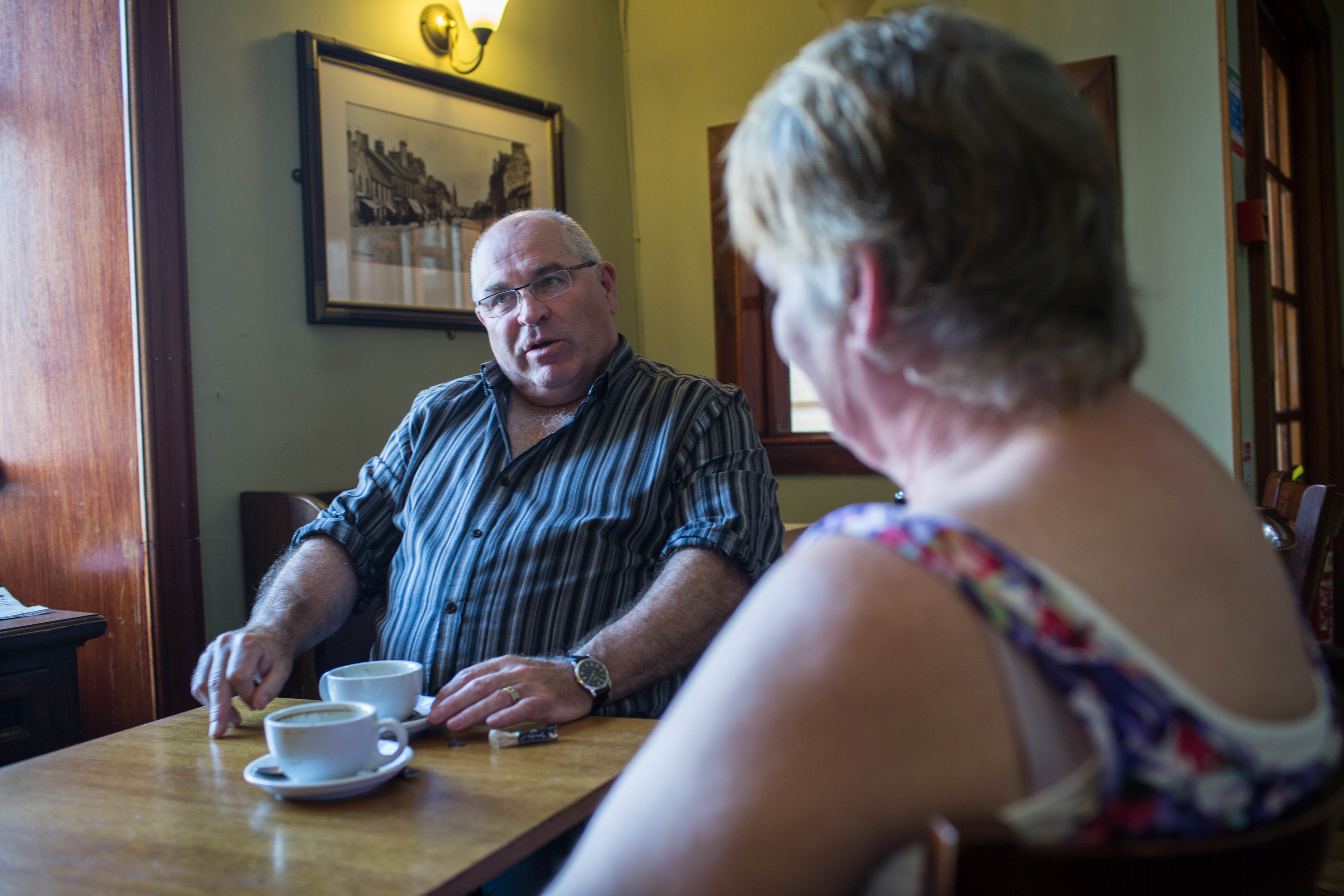
Kelvin Frew
Kelvin is team leader of the NHS Dumfries & Galloway Crisis, Assessment, and Treatment Service. As well as managing the service, and working part time on the crisis response team, he carries a small caseload of regular clients.
It was experiencing the old hospital-centric way of doing things that persuaded Kelvin that there had to be a better way to support people in mental distress. So, some years ago he was asked by his management to try a different approach, and he devised a plan to offer nurse-led crisis assessment and home treatment. The rationale was, instead of routinely admitting people as emergencies when they reached crisis point, why not give access to specialist mental health nurses working autonomously in the community.
“It’s about trying to offer people alternatives to the wards,” he says. “Being in a psychiatric hospital can be bad for you: it carries stigma, there’s a higher risk of suicide, and it affects people’s view of themselves. Inpatient care, unless it is absolutely necessary to preserve safety, very often promotes helplessness. We’re about trying to help people own their problems, to appreciate that they are in control of their own destiny.”
The service’s crisis team of 18 nurses and healthcare assistants, plus four hospital-based liaison workers, offer round-the-clock cover for the whole health board area. From their headquarters in Dumfries, they may be called to any one of the region’s towns or dispatched to visit someone living far out in the country.
“We see people who require very prompt mental health input, people who might pose a risk to themselves or, occasionally, others,” says Kelvin. “That’s when we step in.”
Referrals are usually made by GPs but can come from other parts of the mental health service. Unless the request is for immediate intervention, the requirement is for contact to be made within 24 hours of referral, but in practice contact happens within three hours.
“The staff are all skilled at psychiatric intervention,” says Kelvin. “The cathartic effect of having someone to talk to is often enough to defuse a situation. With encouragement and support, people can come up with their own solutions.”
The service sees around 2,000 people a year and numbers are growing. “There are lots of people diagnosed with life-long conditions that are often a result of childhood trauma, and their problems are very difficult for the individual, and services, to manage effectively,” says Kelvin. “We are seeing more and more people with such difficulties, and they are the ones you least want to see accessing the crisis team. We should be able to offer them better support and treatment in other parts of the mental health system. When people in this situation see the crisis team, it means something has gone wrong with their care.”
As a rule, the crisis team works very closely with people for a short period of time. “If their crises aren’t resolved within six weeks, we need to think again,” says Kelvin, whose staff can refer people on to other mental health teams or to psychologists; to drug and alcohol services, or organisations such as Rape Crisis. “We signpost people to places where they can find long-term support,”
On referral, people are triaged – dealt with in order of clinical priority – and they are usually visited first at home. “You get a better understanding of a person when you see how they live,” says Kelvin. “Poverty is very apparent sometimes, and you can usually gauge if there is supportive community or a family around. You get valuable insights to the whole person and take your lead from there.”
Over the years, professional trust has grown as the service has proved its worth, and now the challenge is keeping it responsive. “It’s quite a labour-intensive operation, and it’s tough on the staff,” says Kelvin. “We are always having to find new ways of spreading the load further without more resources.”
One way of easing pressure has been to train support workers to do some tasks to free up qualified nurses’ time for assessment and treatment. “They’ll do home visits and report back to the trained staff; they’ll deal with basic but crucial things such as checking there’s food in the fridge, the electricity is working, and that the person is able to look after their personal hygiene,” says Kelvin. “The support workers are a vital helping hand.”
“I want to reach out to nursing students, to tell them how rewarding this job is. I want to talk to the public about what a modern mental health service should look like and engage them in taking better care of themselves and others. And I want to be able to influence local developments and policies as a clinical expert in my field,” he says.
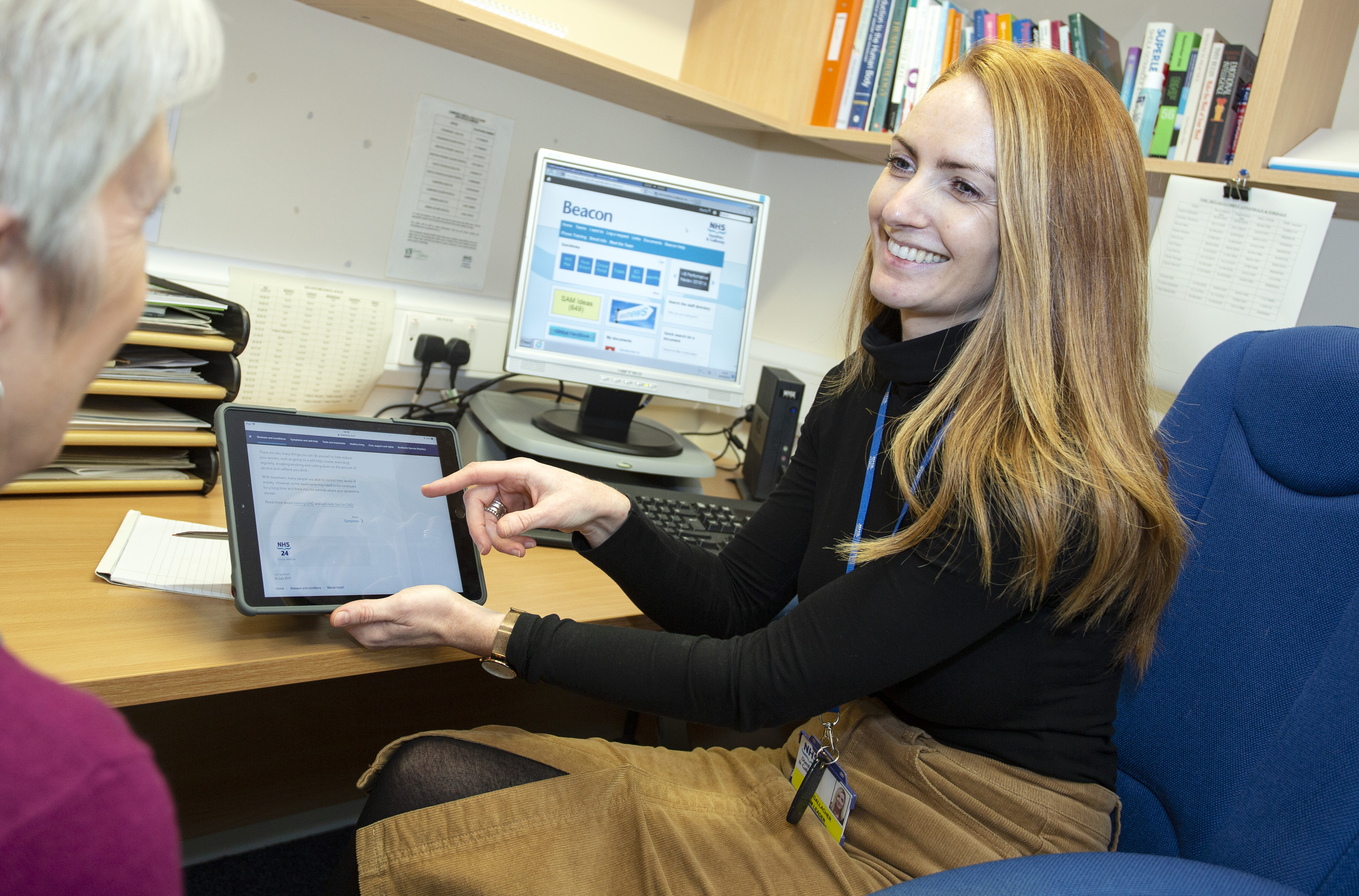
Jeanie Gallacher
I work in the Community Mental Health Service in Annandale and Eskdale, a scenic rural area in Dumfries and Galloway. We are based in the town of Annan but cover small towns and villages across a wide and remote landscape. There is a lot of travel across the locality where I oversee mental health services. We see people with a range of mental health problems, and the type and duration of support will vary depending on every individual’s needs.
I always knew that I wanted to work in Community Mental Health services after being fortunate enough to shadow some fantastic nurses as a student. After working in mental health hospital wards, I applied to work in a community team. I quickly realised this was the right role for me, working with people and their families over longer periods of time, and feeling that I could make a positive difference has allowed me to continue to thrive in this role over the last nine years.
I was given an exciting opportunity to develop a primary care mental health service together with local people. Those who have been able to speak to a mental health nurse at their local GP surgery have really appreciated being able to get the support they need close to home. The success of the initiative meant we have now expanded into every GP practice across our region and help more people to access the right support at the right time. Although I now lead the team, I continue to see people in my community mental health nurse role which is really important to me. I love the balance between making a positive impact for those with mental health issues whilst leading and empowering a team of nurses and healthcare support workers. I am passionate about reducing mental health stigma and promoting hope for recovery for people going through mental health difficulties. My vision is to ensure that mental health is seen as equally important as physical health.
I recently completed an MSc in Mental Health Practice which has helped me consolidate and develop my clinical expertise in enabling mental health recovery as well as developing my skills in leadership. One of the key aspects of my role is in developing therapeutic relationships quickly. When people are telling me, a stranger, about their mental health it can be daunting and distressing. Active listening, compassion, and empathy are key skills to building trust. I never forget the importance of putting someone at ease when I first meet them. Close working with families and carers is vital and often involves difficult conversations and navigating around family dynamics. As a senior mental health nurse, I have significant autonomy, and I make clinical decisions based upon comprehensive mental health assessments. Sometimes people who may be experiencing a relapse of a severe illness do not agree to treatment and this requires robust risk assessment, liaising with family and other clinicians whilst ensuring the therapeutic relationship with that individual is not compromised. It requires a high degree of professional knowledge, skill and compassion.
A man I have known for a long time was going through a difficult period where he was more troubled with psychotic symptoms. He had become further distressed when he had attended a benefits review and his benefits were stopped. This left him in poverty; he would not be able to access activities that previously kept him well and his symptoms meant that he would have struggled to hold down a job. I saw him regularly and helped him learn some new coping strategies to reduce his distress and began the process of appealing the benefits decision. This was a frustrating and daunting process for him, so I advocated on his behalf. After a long drawn out process the decision was reversed. The feedback I received from him was not only had I helped him to resolve an unbearable situation but the reassurance and support I had provided had made a huge difference to his mental wellbeing.
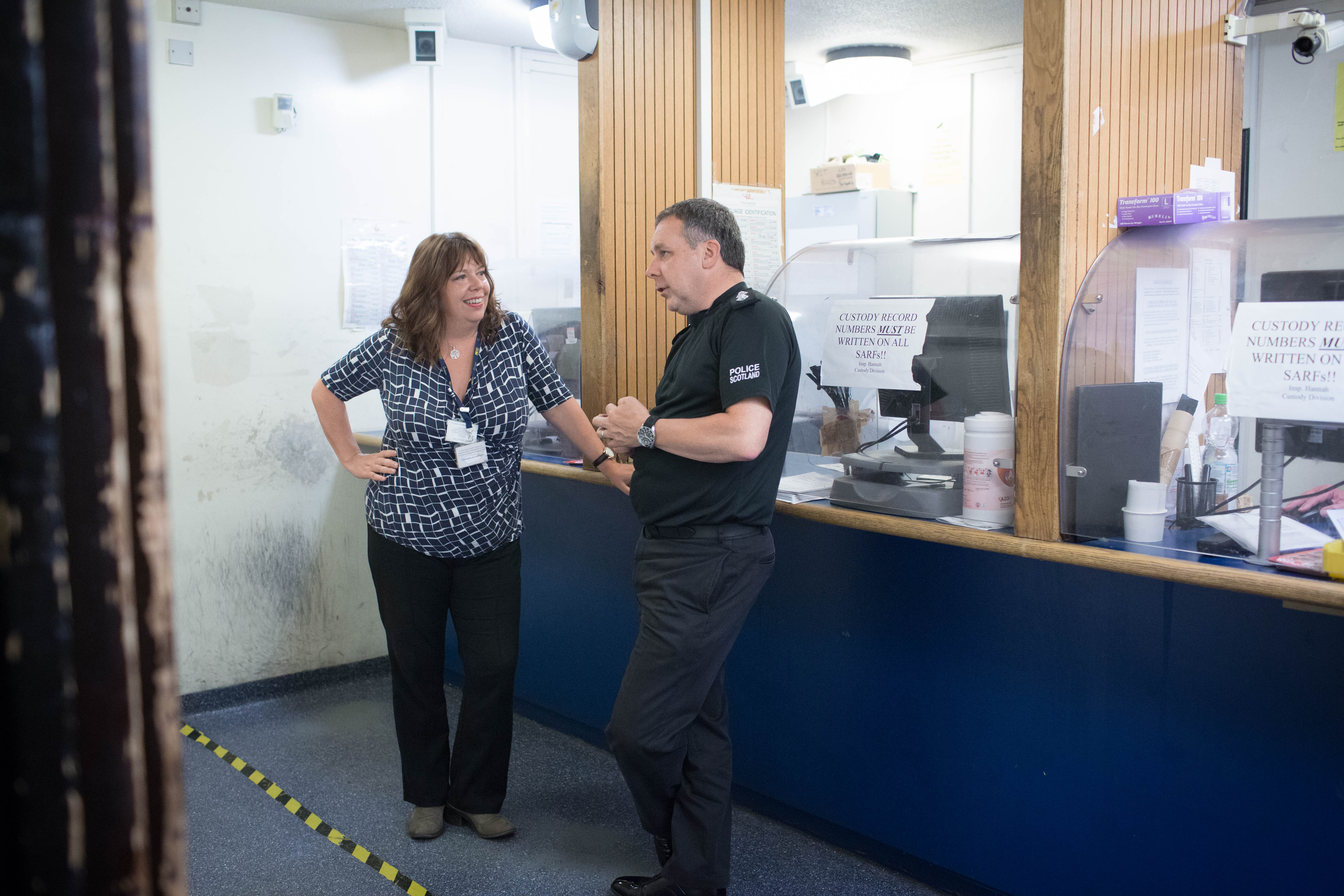
Jessica Davidson
The custody suite below St Leonard’s Police Station in Edinburgh can be an intimidating environment: windowless corridors are lined both sides with thick metal doors, well-worn whiteboards bearing the names of the people behind them. There is a busy charge bar, where people who have been arrested are clerked in, and an office where a bank of security screens is monitored closely.
On a busy day many prisoners will require healthcare attention. “The level of need we see here is high,” says Inspector Colin Hannah, formerly Custody Manager for Edinburgh.
Recommendations following a fatal accident inquiry in 2009 led to the redesign of Scotland’s Custody Healthcare service in 2011. Since that time, this innovative nurse-led model has gone from strength to strength, delivering bespoke custodial healthcare to those brought into police custody.
Presently covering the South East of Scotland, and employing 25 highly qualified nurses, the custody healthcare service has become indispensable. “The healthcare team really are invaluable,” says Inspector Hannah. “Custody Sergeants and staff work closely with them to collectively ensure that the care needs of those in police custody are met and people are kept safe.”
Senior Clinical Forensic Charge Nurse, Jessica Davidson, has been in charge since the start, and she is now one of three senior charge nurses on the team. “We check for health problems – alcohol and drug issues, mental health problems, chronic illness, wounds and such like, and advise accordingly,” she says. “We assess whether people are fit for interview, or for court or release, and undertake other forensic examinations such as testing blood alcohol levels. It’s a busy old brief.”
It is also trail-blazing. Jessica and her team of specialist nurses are developing new services to support people whose health needs have never been well met. “Most of the people who end up in places like this are disenfranchised, marginalised, and may not go near a GP,” says Jessica. “We try to bring the help they need to them.”
Noticing a spike in detentions over weekends, Jessica and her team have developed ‘Sunday Choices’, a one-to-one session focusing on issues such as domestic violence, alcohol and drug misuse, and mental health problems. “If people have come in on the Friday, by the Sunday they have detoxed, eaten, washed, and are on meds. They are also pretty bored and ready to talk to someone,” she says. “It’s a window of opportunity, and we use it to chat with them about their problems, and the things that can be done to help.”
A recent development has been blood spot testing, on-the-spot screening for blood-borne viruses such as HIV and Hepatitis C. In the general population the incidence of Hep C is around 1%, but in the custody community it’s looking more like 25%. “We can link people up with appropriate support before they leave custody and even make appointments for them,” says Jessica. “We can refer directly to the blood borne viruses team, and our community networks are very good.”
In the custody suite clinic alongside the cells, the nurses conduct examinations, apply dressings and, as non-medical prescribers, decide on treatments. “We have shown that we reduce inappropriate referrals to A&E and there are significantly fewer calls to the ambulance service from police stations, so we’re deeply embedded in the organisational DNA now,” says Jessica. “And importantly, we have a positive impact on the lives of the people we care for once they are out. 33% of our Sunday Choices clients are now in treatment programmes”.
As a line manager, Jessica strives to support her team to cope with the particular pressures of an extremely stressful job and talks of ‘vicarious trauma’. “We are exposed to the saddest stories, over and over again, and we have to be able to deal with that,” she says.
“In nursing we are taught to be resistant, not to be emotional,” says custody healthcare Charge Nurse Vicky Walker. “But to do this job well you have to engage wholeheartedly with some tough stuff, be in the moment with traumatic life stories. It’s obvious that you can’t look after others if you don’t look after yourself and Jess is good at supporting us to discuss how we are feeling, to be out in the open and solution focused.”